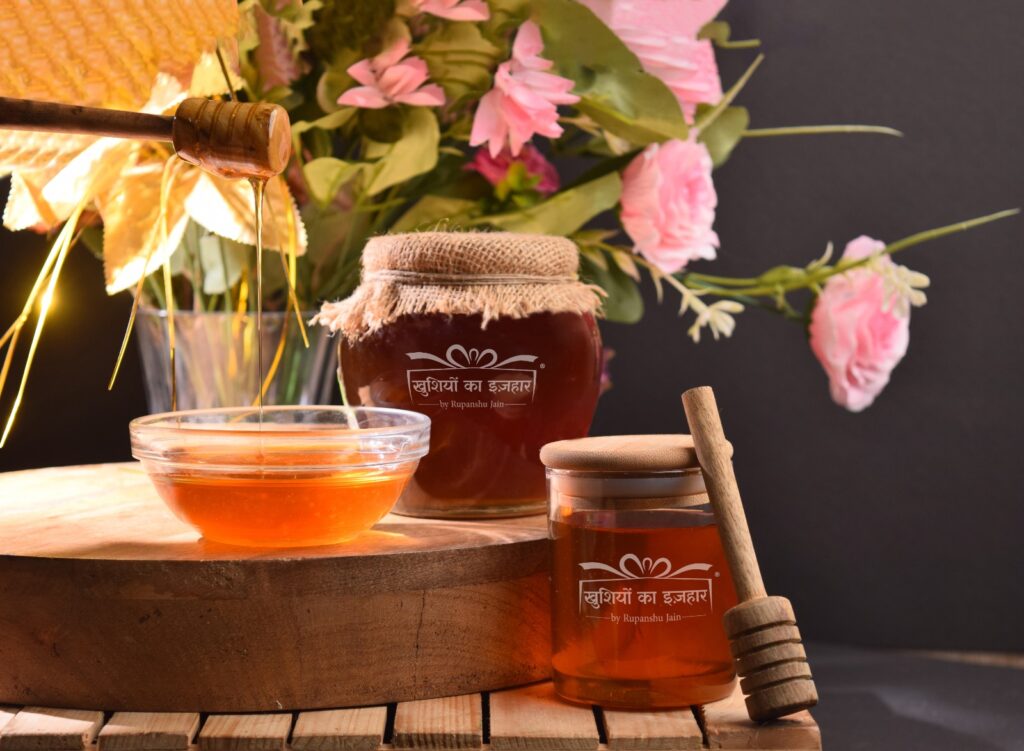Introduction
Throughout history, honey has been cherished as a precious gift of nature, revered for its delectable taste and numerous health benefits. As civilizations evolved, so did the appreciation for this golden elixir. Today, honey continues to be a popular choice for gifting due to its unique origin, diverse benefits on health and skin, and the sheer variety of types available.
Through this blog, we will delve into the origins of honey – a precious gift of nature, its multifaceted advantages for health and skin, the different types of honey, and the fascinating process of honey extraction.
The Origin of Honey
The gift of nature Honey is as old as time itself, with its history dating back thousands of years. The practice of beekeeping, or apiculture, dates to ancient times, with evidence of honey collection found in caves dating back to 8,000 years ago. Ancient Egyptians were known to keep beehives and used honey in various aspects of their lives, including religious rituals, medicinal purposes, and as a sweetener for their delicacies. The sweet nectar of honey comes from the diligent efforts of honeybees, who gather nectar from flowering plants, transform it within their bodies, and store it in honeycombs.
Benefits of Honey on Health
Honey is not just a natural sweetener; it also boasts an array of health benefits:
- Nutritional Value: The gift of nature Honey is rich in essential vitamins and minerals, including vitamin C, calcium, potassium, and iron, making it a wholesome addition to your diet.
- Antioxidant Properties: Honey contains antioxidants, such as phenolic compounds and flavonoids, which help combat oxidative stress and reduce the risk of chronic diseases.
- Soothing Properties: Honey has natural soothing properties, making it a popular remedy for sore throats and coughs. It forms a protective barrier on irritated mucous membranes, providing relief and aiding in the healing process.
- Wound Healing: Topical application of honey on wounds has shown to accelerate the healing process, owing to its antibacterial and anti-inflammatory properties.
- Digestive Aid: Honey can help improve digestion by promoting the growth of beneficial gut bacteria and soothing digestive discomfort.
Benefits of Honey on Skin
Honey’s benefits extend beyond the internal body and into the realm of skincare:
- Moisturizing Properties: Honey is a natural humectant, which means it attracts and retains moisture. When applied to the skin, it helps keep it hydrated and soft.
- Anti-Aging Effects: The antioxidants in honey can combat free radicals that contribute to premature aging, making it a natural anti-aging ingredient in skincare products.
- Acne Treatment: Honey’s antibacterial and anti-inflammatory properties can help combat acne-causing bacteria and reduce redness and inflammation in acne-prone skin.
- Exfoliation: The enzymes in honey can gently exfoliate the skin, helping to remove dead skin cells and promote a smoother complexion.
- Sunburn Relief: Honey’s soothing properties can provide relief from sunburn and aid in the healing process of damaged skin.
Types of Honey
The diversity of honey arises from the varying floral sources and geographical locations where bees collect nectar. Some popular types of honey include:
- Wildflower Honey: Derived from a mixture of nectars from various wildflowers, this type of honey offers a rich, robust flavor and is unique to each region.
- Manuka Honey: Hailing from New Zealand, Manuka honey is renowned for its exceptional antibacterial properties, attributed to the Manuka tree’s nectar.
- Lavender Honey: Collected from lavender fields, this honey has a delicate floral aroma and a slightly sweet taste, making it a delightful addition to culinary creations.
- Acacia Honey: With a light, transparent appearance and a mild, floral flavor, acacia honey is popular for its slow crystallization process.
- Eucalyptus Honey: Gathered from eucalyptus trees, this honey has a bold and slightly medicinal taste, often chosen for its potential respiratory health benefits.
Way of Honey Extraction
The process of honey extraction involves several steps to ensure the honey is harvested while preserving the health of the bee colony:
- Smoking the Hive: Beekeepers use a smoker to calm the bees before beginning the extraction process. The smoke triggers the bees’ natural response to prepare for a possible forest fire, causing them to gorge on honey and become less aggressive.
- Removing the Honeycomb Frames: Beekeepers carefully remove the honeycomb frames from the beehive, making sure not to damage the delicate wax cells.
- Uncapping: The wax caps covering the honeycomb cells are carefully removed using a hot knife or a honey uncapping fork, exposing the honey.
- Honey Extraction: The uncapped honeycomb frames are placed in an extractor, a device that uses centrifugal force to spin the honey out of the combs.
- Filtering and Bottling: The extracted honey is filtered to remove any debris or wax particles, and then it is bottled, ready for consumption or gifting.
Conclusion
Honey is truly a gift from nature, with its rich history, numerous health benefits, and diverse varieties. Whether you choose it for its sweetness, health advantages, or skincare benefits, gifting honey is a thoughtful and cherished gesture.
So, the next time you want to express your affection, gratitude, or care to a loved one, consider presenting them with a jar of this golden elixir by Rupanshu Jain Creations—a one -stop solution for all your premium gifting requirement.



Pingback: Creative Ways to Use Honey in Your Daily Life - Rupanshu Jain Creations